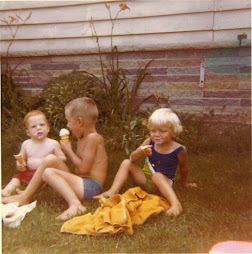I guess there probably were - like don't judge people by their appearances and stuff like that but did I notice when I was reading them? Did I finish "Blubber" or "Deenie" or "It's Not the End of the World" (my personal fave) and think to myself "Wow, I learned a lot" or "Gee I'm never going to look at a girl who is overweight or wears a back brace in the same judgmental way ever again"? Maybe I did, but I don't think books have an obligation to teach something. One of my bookstore pet peeves were customers who wanted to buy books for their kids/grandkids/nephews/etc that "taught a lesson". Seriously, did these same people think the Berenstain Bears were quality literature? (no offence to the BBears, they have their place). I just think there is something to be said for reading for the love of reading and reading to encourage the love of getting lost in a great story.
So there's a reason I'm pondering this all of a sudden. I have been on holidays for two weeks and have spent a big my reading time devouring YA - most of it aimed at girls: "Audrey, Wait:" by Robin Benway, "The Boy Book" by E Lockhart, "Nothing Like You" by Lauren Strasnick, "The Treasure Map of Boys" by E Lockhart, "Gingerbread" by Rachel Cohn - you get the idea. The question nagging at me is - if I had read THESE books 28 years ago when I was 14 would I have made different decisions the rest of my life? Would I have felt more empowered as a girl? Would the situations the main characters in these books suffered through have made me more guy savvy? Would I have more confidence to be different?
Girls today can read about kick-ass girl characters like Katsa from "Graceling" or Katniss from "The Hunger Games" or about girls like Frankie Landau-Banks who challenge the status quo - I don't remember ANY characters like that from the books of my youth. I read lots of mystery novels where girls wore sweater sets, books set in boarding schools or in large families. I loved the books by Jean Little when I was in junior high, then after the requisite "Flowers in the Attic" stage I found Mary Stewart and Phyllis A Whitney - sure young women solved mysteries but they didn't kick anyone in the head or tell a guy off.
Is it just that we can write about these things in books now - that it's more acceptable because as a society we've come to accept females as fighters or as equals to men (ha, I know not everyone thinks that way) that these books are popular now? If someone had written "The Hunger Games" in 1982 would it have been published? Would anyone buy it? Would the 1982 me read it? I guess I'll never know.
Friday, September 3, 2010
Thursday, September 2, 2010
What to Read (and what NOT TO) after Mockingjay
I, like bazillions of others, recently finished Mockingjay & I thought I'd see what the experts are recommending for fans to read next. I saw many of such lists post-Harry Potter and I always found them interesting. True, I no longer work in a bookstore so maybe I don't need the info to help my customers, but I'm always looking for great YA to read.
First: this list is garbage:
AMELIA BEDELIA? I am all for people buying and reading Amelia Bedelia but it's for kids learning how to read!
Here's my list:
1. Graceling by Kristin Cashore
2. The Forest of Hands and Teeth by Carrie Ryan
3. I Am Number Four by Pittacus Lore
4. Ender's Game by Orson Scott Card
5. Sabriel by Garth Nix
6. Airborn by Kenneth Oppel
7. The Uglies by Scott Westerfeld
8. Little Brother by Cory Doctorow
Subscribe to:
Comments (Atom)




